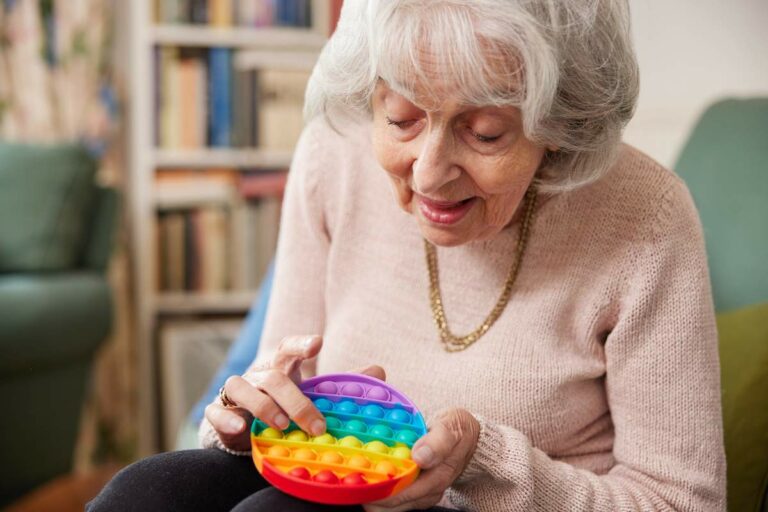Sensory experiences shape every moment of our lives, connecting us to the world around us in ways we often take for granted. Yet, as we age, these connections can become less vibrant, affecting not only our perception of reality but also our overall well-being. This profound shift compels us to explore the significance of sensory change and what we can do to maintain and enhance our connection with the world.
Our team at SaraBella Senior Living is sharing what changes to expect in your senses and how sensory stimulation can benefit you.
Changes in Sensory Perception

Vision
With the passing years, the lenses in our eyes become less flexible, leading to difficulty focusing on close objects. This common condition, called presbyopia, usually begins to affect individuals in their early to mid-40s. Additionally, degenerative eye diseases such as macular degeneration and glaucoma can diminish peripheral vision and visual acuity, potentially leading to blindness. The impact of these changes on an individual’s independence and lifestyle is immense.
Hearing
Hearing loss, a decidedly common issue among aging adults can be attributed to several factors, including genetics, long-term exposure to noise, and simply the aging process. High-frequency sounds and conversations in crowded spaces may become particularly challenging, leading to social isolation and a decline in communication-rich hobbies.
Taste and Smell
An often overlooked aspect of aging is the decline in taste and smell. The reduced sensation of these senses can lead to diminished enjoyment of food, potentially resulting in poor nutrition and weight loss. It also poses significant risks, such as an inability to recognize potentially harmful odors, like gas leaks.
Touch
Aging skin is less sensitive than younger skin due to the thinning of the epidermis and dermis layers and a decrease in the number of nerve endings. This can affect a person’s ability to feel an injury, leading to the neglect of cuts, pressure sores, or burns. Additionally, the loss of tactile acuity can contribute to a decreased sense of balance and an increased risk of falling.
The Importance of Sensory Stimulation
Sensory stimulation is not just a source of enjoyment, but it is also crucial for maintaining an engaging and fulfilling lifestyle.
Cognitive Benefits
Sensory stimulation encourages a healthy brain by activating and challenging various cognitive functions. Engaging in hobbies or tasks that stimulate the senses can foster neural plasticity, promote learning and memory retention, and delay the onset of neurological conditions such as dementia.
Emotional Well-being
Sensory actions can be deeply comforting and provide a source of joy and serenity, particularly for those who may be coping with loneliness or depression. The right sensory experience has the power to reduce stress and anxiety, offering a much-needed escape and helping to maintain emotional equilibrium.
Social Interactions
Engaging the senses can also be a catalyst for social interaction, fostering connections and shared experiences. Group programs like gardening, music therapy, or simply sharing a meal can become rich in sensory stimuli and provide a platform for meaningful engagement.
Enhanced Overall Wellness
Engaging the senses can prolong independent living by enhancing one’s ability to interact with their surroundings. It allows for a richer experience of the world, increasing enjoyment and satisfaction with life’s daily activities.
Practical Tips for Sensory Stimulation
Bringing sensory stimulation into your daily routines does not have to be complex or difficult. Here are some practical strategies for enhancing sensory experiences:
Engaging Programs for Each Sense
- Vision: Regular eye check-ups are essential to maintaining good vision. Programs that contrast colors and use different lighting can also help keep the eyes sharp.
- Hearing: Conversations, audiobooks, or music can help maintain auditory acuity. For those with hearing aids, regular maintenance and adjustments as needed are crucial.
- Taste and Smell: Regular mealtimes with a variety of foods, including those with diverse textures and aromas, can keep these senses stimulated.
- Touch: Incorporating programs that involve different textures, such as gardening or painting, can provide a tactile experience that engages your sense of touch.

—
Sensory change can be poignant and profound as we age, but it does not have to define our experience. By recognizing the importance of sensory stimulation and actively seeking to engage our senses, we can continue to lead fulfilling and vibrant lives. These insights serve as a gentle reminder that a rich and varied sensory life paves the way to a lifestyle that truly shines.
We invite you to visit our website or contact a member of our team to learn more about the programs and services in our Sarasota senior living community and how we can help you or a family member stimulate the senses!






